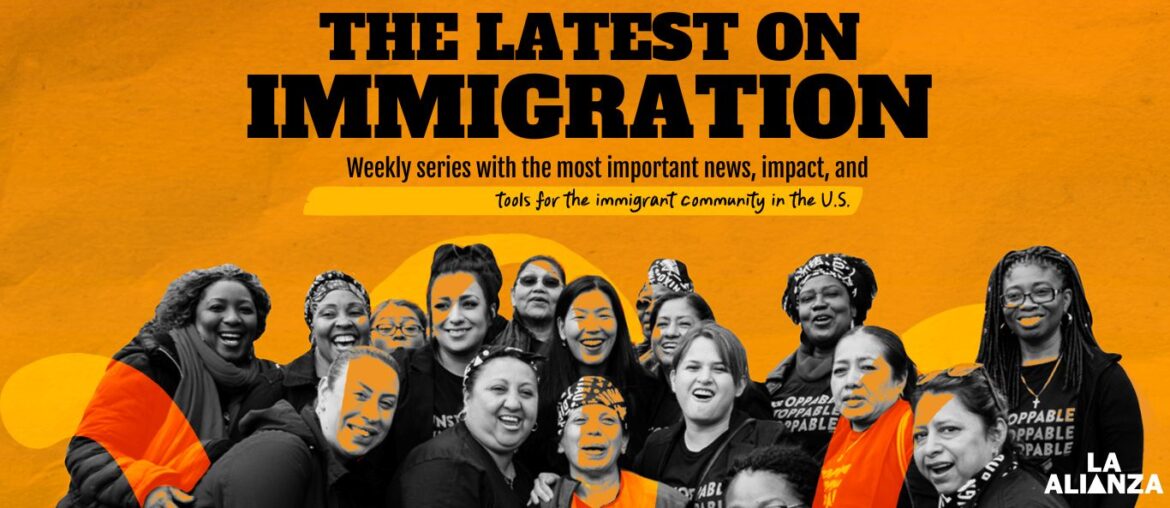This is a summary of the most important immigration news from February 26th – March 5th, 2025. During this period, the Trump administration announced a new compulsory registration requirement for migrants and eliminated the use of CBP One as a valid ID at airports, which puts a restriction on domestic flights for people without legal status. While Democrat legislators re-introduced a bill that seeks to assign a pathway to citizenship for DACA and TPS beneficiaries.
Recent News
Mandatory registration for immigrants: The Trump administration implemented a new registration requirement for immigrants in the U.S., in compliance with the Executive Order “Protecting the American People Against Invasion“, signed January 20th, 2025.
- What we know: The Department of Homeland Security (DHS) has established a new compulsory registration requirement for certain immigrants in the U.S. Those who should register and provide their fingerprints are:
- Who should register:
- Immigrants 14 years or older who were not registered when applying for a visa and who remain in the U.S. for more than 30 days. They should complete the process before that period expires.
- Parents or legal guardians of minors under 14 who have not been registered. They are responsible for registering them before reaching a 30 day stay in the country.
- Minors under 14 who turn 14 in the U.S. They should update their registration within 30 days of their birthday.
- Who is exempt from the registration?:
- Permanent legal residents.
- People with valid visas or with previous immigration processes under which they were already registered.
- Some Indigenous communities, like the Kickappo Tribe from Texas.
- Consequences of not registering:
- If you don’t comply with this requirement, there could be fines, civil penalties and criminal charges, in addition to increasing the risk of deportation.
- Once the registration has been completed, immigrants older than 18 should carry their registration document with them at all times, as not doing so could be considered a federal crime.
- Why this is important: The government argues that this measure is part of an effort to incentivize immigrants with an irregular status to voluntarily leave the country. However, human rights organizations have warned that the norm could generate more fear, limit access to services and increase detentions and deportations.
- What you can do:
- DO NOT REGISTER before getting legal advice by a trusted immigration lawyer. You can access the NDWA attorney directory (NDWA is the partner organization to La Alianza), going to the following link: https://www.domesticworkers.org/resources/immigrant-rights/find-legal-help/ . There, you can find information about where you can access legal aid near your home.
- Avoid fraud: USCIS has alerted about possible fraud related to registrations. The only official source is the government website: https://www.uscis.gov/alienregistration.
- If you qualify for the registry, you should create a USCIS account: Beginning on February 25th, immigrants can create an online account at USCIS in preparation for the registration process. It’s important to keep in mind that the form has not yet been published.
- Impact on immigrant communities: The new policy could restrict immigrant access to essential services like health, education and legal aid, because the fear of being identified and detained could dissuade them from turning to public institutions. Not registering or not carrying proof of registration could be considered a federal crime, which exposes thousands of people to the risk of criminal prosecution.
Reintroduction of the “American Dream and Promise Act” to protect DACA and TPS: A group of Democrat legislators reintroduced the “American Dream and Promise Act“, a bill that seeks to provide a pathway to citizenship for DACA and Temporary Protected Status (TPS) beneficiaries.
- What we know: The initiative, led by Congresswomen Sylvia García (D-TX) and María Elvira Salazar (R-FL), seeks to provide stability for thousands of immigrants. Organizations like UnidosUS have backed the measure, highlighting that the regularization of these groups could add $1.5 billion to GDP in the next decade and generate more than 400,000 jobs.
- Why this is important: If passed, the bill would bestow permanent legal status to hundreds of thousands of people who have lived in the U.S. for years without a definitive solution. In order for the American Dream and Promise Act to become law, it needs to be approved by the House of Representatives, get 60 votes in the Senate and be signed by the President.
- What you can do: The potential beneficiaries could follow up on the project’s progress and keep themselves informed through specialized organizations or following Congresspeople on social media who galvanized it, like Sylvia García and María Elvira Salazar.
Restrictions on domestic flights for undocumented immigrants: The Transportation Security Administration (TSA) announced that immigrants without legal status can no longer board domestic flights, except in cases of self-deportation or transfers between detention centers. This measure would eliminate the use of the CBP One app as a form of ID at airports, which would impact thousands of people.
- What we know: From February 26th, TSA stopped accepting CBP as a valid document to board domestic flights. The restriction affects immigrants that entered with parole or that are awaiting a resolution to their cases and that until now had used this application as a form of identification. Only those whose flight is authorized by ICE for purposes of deportation will be allowed to fly.
- Why this is important: The decision limits the mobility of thousands of immigrants in the regularization process, which could hinder their attendance to immigration hearings, reuniting with families, or traveling for work. It also leaves without option those who have not been able to get a valid state identification document.
- What you can do: Immigrants should check if they have a valid identification document in accordance with the Real ID Act or consider other options of travel, such as buses or trains. It’s also recommended to seek legal advice to understand how this measure could affect your immigration case and evaluate possible alternatives to regularize your documents.
IMMIGRATION IN NUMBERS
- The number of immigrants in ICE detention centers increased from 39,238 to 41,169 in February. Of the 4,422 new people detained in the first two weeks of the month, 41% of them did not have criminal records.
- Since January 2025, more than 5,200 companies in the U.S. have received I-9 audit notices from Immigration and Customs Enforcement (ICE) as part of a national operation focused on compliance of immigration laws in the labor sector.
RESOURCES
- For more help, visit the National Domestic Workers Alliance’s “Know Your Rights” hub. It includes immigrants’ rights, immigration options, and a legal aid directory, among other resources. To access the information, visit ndwa.us/immigrant.
Note: The National Domestic Workers Alliance is the partner organization of La Alianza
- To identify reliable information, visit: How to identify fake news about immigration and avoid misinformation.
Legal Disclaimer: This information is provided for educational purposes and does not constitute legal advice. It is recommended that you consult with an immigration attorney to assess your specific situation.




